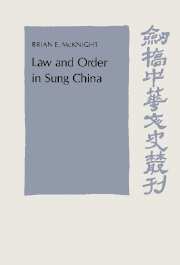Book contents
- Frontmatter
- Contents
- List of figures, maps, and tables
- Preface
- List of abbreviations
- 1 Introduction
- 2 The historical context
- 3 Crimes and criminals
- 4 Informal and semiformal agencies of law enforcement
- 5 Formal civil agencies of law enforcement
- 6 The role of the military in law enforcement
- 7 Supervision of law enforcement – the role of the intendants
- 8 Personnel selection
- 9 Urban crime and urban security
- 10 The Sung penal system
- 11 Jails and jailers in the Sung
- 12 Penal registration
- 13 The death penalty
- 14 Modifications of penalties
- 15 Conclusion
- Glossary
- Bibliography
- Index
Preface
Published online by Cambridge University Press: 23 December 2009
- Frontmatter
- Contents
- List of figures, maps, and tables
- Preface
- List of abbreviations
- 1 Introduction
- 2 The historical context
- 3 Crimes and criminals
- 4 Informal and semiformal agencies of law enforcement
- 5 Formal civil agencies of law enforcement
- 6 The role of the military in law enforcement
- 7 Supervision of law enforcement – the role of the intendants
- 8 Personnel selection
- 9 Urban crime and urban security
- 10 The Sung penal system
- 11 Jails and jailers in the Sung
- 12 Penal registration
- 13 The death penalty
- 14 Modifications of penalties
- 15 Conclusion
- Glossary
- Bibliography
- Index
Summary
All human associations face some problems of deviance and must respond when they feel threatened. When looking at the responses of any human group, we can see commonalities, people doing things in the same way for the same reasons. As the focus of inquiry narrows, the shared traits of the broader levels are retained, but in addition other characteristics appear that are specific to the level of inquiry. For example, all known societies abhor murder, but what sorts of homicides do they classify as murder? Such differences affect not just the definitions of crimes but also the law-enforcement responses. The law-enforcement systems of all formally organized states share some traits that we cannot find in simple societies. And preindustrial agrarian bureaucratically organized states, like traditional China and the Byzantine Empire, again share some law-enforcement problems and responses to problems peculiar to states of their type.
In moving down through this nested hierarchy of organizational types, we reach one of the key steps at a level where the social units are distinct as unique cultural and political entities. What was peculiarly Byzantine, or peculiarly Chinese, about the perception of law-enforcement problems and responses and about the ways in which lawbreakers were treated? These attributes, which distinguish one such political entity from another, are simply parts of our definition of what it is to be Chinese or Byzantine or Roman. Such defining attributes evolve over time. The Chinese language has changed from the time of the Shang dynasty to today. However, the changes in these fundamental attributes are evolutionary, not revolutionary. Despite the ways in which it has changed, the Chinese language has remained the Chinese language.
- Type
- Chapter
- Information
- Law and Order in Sung China , pp. ix - xiiiPublisher: Cambridge University PressPrint publication year: 1992



